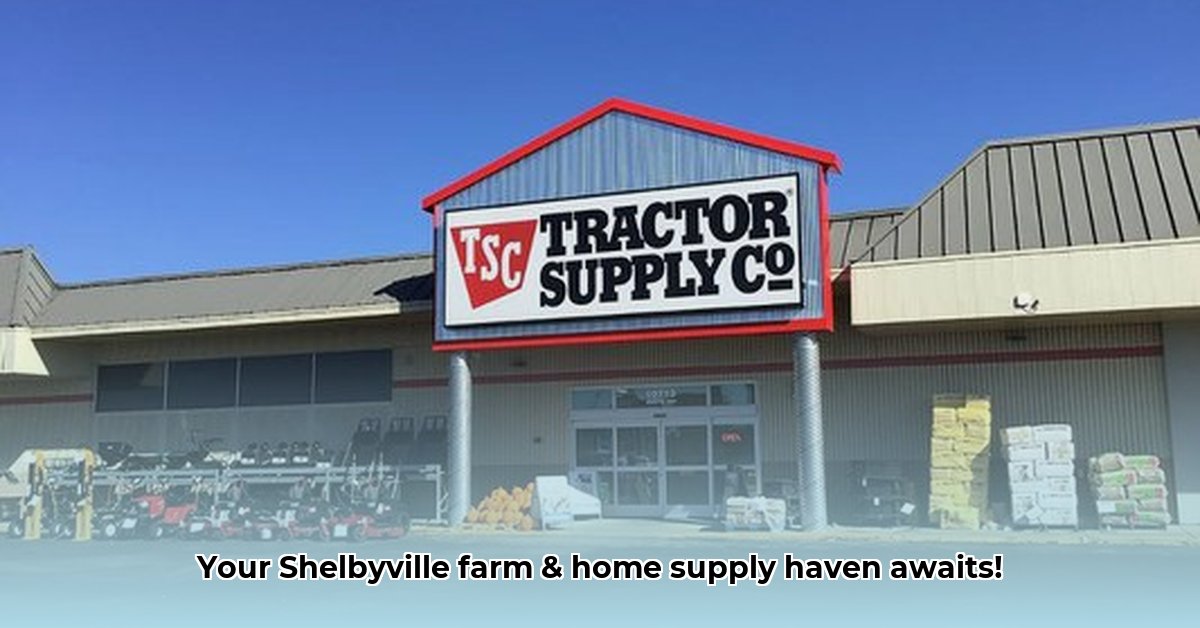
Understanding Tractor Supply Co. Shelbyville, KY
Tractor Supply Co. (TSC) in Shelbyville, Kentucky, situated at 448 Old Brunerstown Road, serves as a crucial resource for the surrounding communities of Shelbyville, Taylorsville, Fisherville, and beyond. Its central location caters to a diverse clientele, including established farmers, weekend gardeners, and pet owners. This broad customer base presents both opportunities and challenges for the store. How can TSC optimize its operations to best serve this diverse market?
For more on TSC's Kentucky presence, check out this related location.
Customer Base: A Diverse Landscape
TSC Shelbyville's customer base is a compelling mix of experienced farmers relying on the store for essential supplies, hobbyists engaging in gardening projects, and pet owners ensuring the well-being of their animals. This diversity necessitates a well-balanced inventory and tailored services. What strategies can ensure consistent satisfaction across these varied segments?
Product Variety: Meeting Diverse Needs
TSC Shelbyville offers a comprehensive inventory ranging from livestock feed and farm equipment to an extensive selection of gardening supplies and pet food. This wide array of products is a significant advantage, catering to the needs of rural and suburban residents alike. However, continuous analysis of purchasing patterns is key to optimize inventory and address potential supply gaps. What additional product categories or locally-sourced goods could expand the store's appeal?
Strengths, Weaknesses, Opportunities, and Threats (SWOT) Analysis
TSC Shelbyville benefits from a highly knowledgeable and friendly staff and a convenient location accessible to a broad customer base. However, competition from other retailers and the challenges of a fluctuating supply chain are significant factors to consider.
Strengths: Knowledgeable staff, convenient location, wide product selection. Weaknesses: Competition from other retailers, supply chain vulnerabilities. Opportunities: Enhanced customer service training, targeted marketing to specific demographics, strategic partnerships with local businesses. Threats: Economic downturns, changes in regulations, unforeseen supply chain disruptions.
Strategies for Success: Short-Term and Long-Term
To ensure continued success, TSC Shelbyville requires a robust strategic plan.
Short-Term Goals (Within the Next Year):
- Enhance Customer Service: Invest in comprehensive staff training focusing on product knowledge and customer interaction, aiming for a 15% improvement in customer satisfaction scores.
- Optimize Inventory Management: Implement data-driven inventory analysis to reduce surplus stock and ensure optimal shelf space utilization, targeting a 10% reduction in excess inventory.
- Community Engagement: Establish strategic partnerships with local farmers' markets and community organizations to increase brand awareness and strengthen local ties.
Long-Term Goals (Over the Next 3-5 Years):
- Targeted Demographic Research: Conduct detailed demographic research to anticipate future customer needs and adjust product offerings accordingly.
- Expand Product Offerings: Introduce new product lines based on identified community needs and emerging market trends.
- Enhance Digital Presence: Develop a user-friendly website incorporating online ordering and delivery options to expand reach and improve customer convenience.
Mitigating Supply Chain Risks: A Proactive Approach
TSC Shelbyville, like other rural retailers, faces unique supply chain challenges. How can the store create a more robust and resilient supply chain?
Proactive Risk Management: Regularly assess potential disruptions (severe weather, transportation issues, supplier insolvency) using a risk matrix. Prioritize mitigation strategies based on likelihood and impact.
Technology Integration: Implement advanced supply chain management (SCM) software for real-time tracking, automated alerts, and predictive analytics. This enhanced visibility will lead to more efficient resource allocation.
Strengthened Supplier Relationships: Foster collaborative relationships with key suppliers to ensure timely deliveries and establish contingency plans for unforeseen disruptions.
Diversification of Suppliers: Reduce reliance on single-source suppliers by exploring alternative sourcing options to minimize risks associated with potential supplier failures.
Contingency Planning: Develop and regularly update detailed contingency plans for high-priority risks, including alternative sourcing, transportation routes, and communication strategies.
Collaboration: Engage in collaborative efforts with suppliers, logistics providers, and local authorities to build a resilient and interconnected supply chain.
"A strong supply chain isn't just about logistics; it's about building trust and collaboration with all stakeholders," says Dr. Emily Carter, Professor of Supply Chain Management at the University of Kentucky. "This proactive approach is essential for success in the dynamic rural market."
By implementing these strategies, Tractor Supply Co. Shelbyville can ensure its continued success and remain a vital resource for the community.